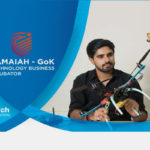Self Hosted Video example
For the last three consecutive years, Qualcomm has successfully hosted the Qualcomm Design in India Challenge, a platform that helps product startups working on useful and innovative hardware products, in turn supporting India’s technology ecosystem and the dream of a digital India.
Qualcomm helps startups speed up their design cycles as well as time to market by providing relevant Qualcomm technologies and product development support at the Qualcomm Innovation Lab in Bengaluru. This includes design, development and software support from a dedicated Qualcomm engineering team, access to a dedicated lab with high-end equipment for camera and audio tuning, RF calibration for WiFi, Cellular, BT and GPS, thermal testing, and access to free samples of QC SoCs and development kits and SW platforms
The 2018 program has evolved from 2016 and 2017. While the overall format has largely been maintained, the key change is the rollback to a single cohort, like in 2016, rather than two cohorts in 2017. The third edition also has additional incentives for the 15 shortlisted startups, such as $5,000 for filing patents during the incubation phase and accelerator programme services from Anthill Ventures. The shortlisted startups also get an initial cash award of $10,000 each.
The 15 chosen startups working in the areas of medtech, smartinfra and wearables are undergoing hardware incubation at the Qualcomm Innovation Lab until February 2019. At the end of the incubation period, the startups will participate in the finale and three winning startups will be awarded $100,000, $75,000 and $50,000 respectively.
Here’s a quick look at five medtech startups and how they are working on making an impact in the healthcare sector, and leveraging Qualcomm Technology:

Artelus India
Bengaluru-based Artelus leverages Deep Learning and Artificial Intelligence to develop AI-powered primary screening devices that can detect TB, breast cancer, lung cancer and diabetic retinopathy, enabling clinicians to make a faster and more accurate diagnosis and provide preventive care. It was founded in October 2015 by Pradeep Walia, a serial entrepreneur whose startup had over 24 patents in AI technology, Rajarajeshwari K and Lalit Pant. Artelus has a vision to reach out to the ‘forgotten billion’ (primarily people in rural areas and those who cannot afford healthcare) by making it possible to deliver a quality healthcare experience beyond the boundaries of hospitals and specialised clinics, while reducing the burden of the already overworked healthcare practitioners in India.
Bioscan Research
Traumatic Brain injury (TBI) is one of the leading causes of disability around the world. It is estimated that around 10 million people are affected annually because the injury is detected at a very late stage when the brain has already suffered irreparable damage.
To address this challenge, Ahmedabad based startup Bioscan Research team is using patented technology to develop the world’s fastest brain haemorrhage detector that can detect the injury at an early stage within two minutes. The non-invasive, portable device is being developed to enable even non-medical practitioners to screen patients.
mBreath Technologies
A smart home healthcare company based in Kharagpur, mBreath Technologies is working on developing Artificial Intelligence (AI)-based wireless home health monitoring devices for diagnosing and monitoring health status. One of its key product is SleepDoc+, a wireless multi-person sleep assistant that uses ultra-low power FMCW (frequency-modulated continuous-wave) radar to detect vital physiological parameters like the respiration rate and heart rate of multiple people simultaneously from a distance of 3-5 meters. The IoT-based solution determines the sleep quality of the user and helps to diagnose sleep-related disorders such as sleep apnea, snoring, insomnia, etc.
Cradlewise (Chigroo Labs)
Founded by Bharath Patil and Radhika Patil in November 2017, Chigroo Labs is building a small cradle for babies with auto-swinging and integrated contactless baby monitoring capabilities, called Cradlewise.
The cradle can be used for an entire day after being charged for just two hours and consumes less power. The related mobile app can be used for video and audio monitoring and the sleep reports generated can help parents understand how well the baby is sleeping.
Cradlewise is using the IoT offerings from Qualcomm. “A Snapdragon chipset is the core of the smart cradle. We are using the APQ8016 from Snapdragon 400 series. The powerful processor helps us detect and act on events in real time. It also helps us in doing edge computing. The bundled software which is open sourced for the Snapdragon platform helps us in accelerating development,” says Radhika.

Turtle Shell Technologies
Turtle Shell Technologies’ non-contact, non-wearable health monitor Dozee can be placed under the mattress to track and develop the health baselines of a user, making monitoring health super easy.
Dozee keeps track of a user’s vitals, heart rate, respiration, sleep patterns, restlessness, stress levels and other parameters on a regular basis and does a trend-based analysis to detect any early signs of health deterioration which might need attention. The Advanced Health Intelligence platform has already proved to be a life-saver for many of its customers, by alerting users about early symptoms of tuberculosis, sleep apnea and threatening infections. Dozee has been clinically tested and proven to have an accuracy rate of 98.4 percent, which is akin to medical grade sensors. The independent studies have been conducted at HCG Oncology and NIMHANS, Bangalore.
The team plans to use Qualcomm’s Snapdragon 212 chipset. This will help them in running all their algorithms in real-time on the device, which currently run on remote servers hosted on their cloud platform.



A wonderful serenity has taken possession of my entire soul, like these sweet mornings of spring which I enjoy with my whole heart.
Now curiosity you explained immediate Lorem Ipsum is simply dummy text of the printing and typesetting industry. Lorem Ipsum standard dummy lorem Ipsum is simply dummy.
Design is the fundamental soul of a man-made creation that ends up expressing itself in successive outer layers of the product or service.
Neque turpis vitae eros praesent varius. Egestas pellentesque urna blandit, sed ac leo ut mi, nam wisi, laborum donec erat amet.
Prepared do an dissuade be so whatever steepest. Yet her beyond looked either day wished nay. By doubtful disposed do juvenile an.